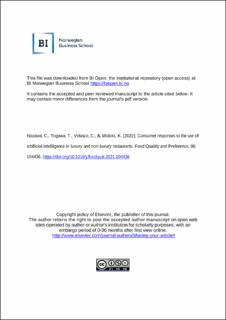Consumer responses to the use of artificial intelligence in luxury and non-luxury restaurants
Journal article, Peer reviewed
Accepted version
Permanent lenke
https://hdl.handle.net/11250/3077572Utgivelsesdato
2021Metadata
Vis full innførselSamlinger
Originalversjon
10.1016/j.foodqual.2021.104436Sammendrag
There has been an ever-increasing interest in artificial intelligence (AI) in the hospitality sector. However, it is still unclear how consumers respond to products/services in hospitality industries provided by AI. Building on the theoretical framework for using AI in different services and the literature on luxury consumption, across four studies, we investigated how consumers evaluate different types of restaurants that are run by AI vs. humans. The results demonstrated that consumers evaluated food and restaurants more negatively where the service is provided by AI (Study 1). This effect was higher in luxury restaurants compared to casual dining (fast food, casual restaurants) (Studies 2 and 3). Moreover, we identified the underlying mechanism of this effect by showing that in luxury (vs. casual) restaurants, foods cooked by AI negatively influenced evaluations of three dimensions of restaurants’ quality, such as food, service, and ambience quality, decreasing the intention to visit the restaurant (Study 4). Altogether, these findings reveal some effects that AI can have in the hospitality industry and provide practical insights on how to introduce AI in restaurants.

